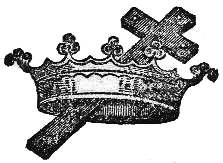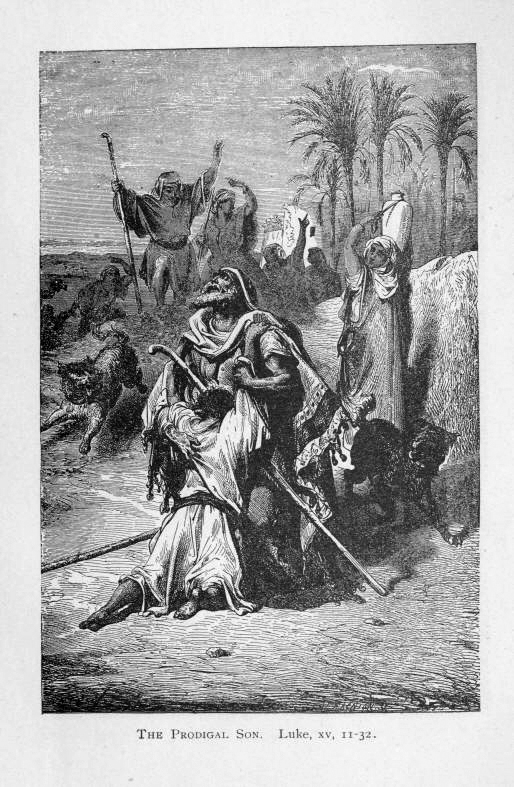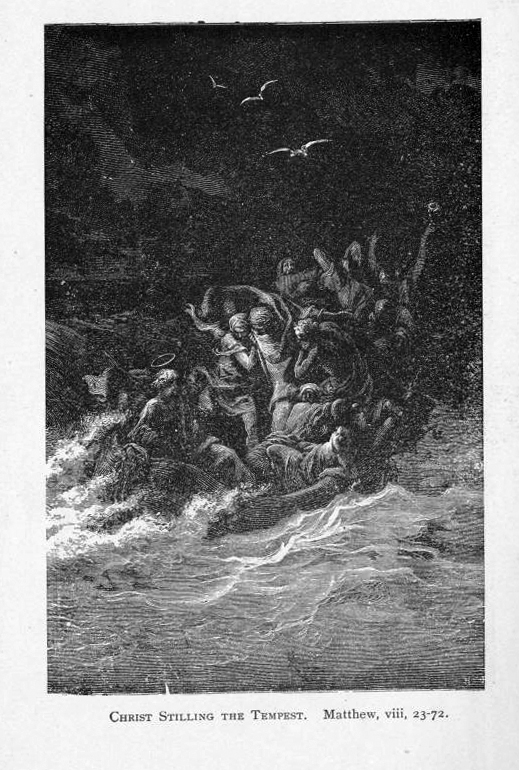
Moody's Anecdotes And Illustrations
By Dwight L. Moody
W
|
-- I remember a gentleman of Boston, a man high in life, a Congressman, who was accustomed to carry with him little cards and distribute them wherever he went, and on some of these cards were words like these: "I expect to pass through this world but once, and therefore if there be any kindness I can show, if there is anything I can do to make men happy, I shall do it, for I may not pass this way again." -- A man was asked what his persuasion was. He said it was the same as Paul's. I don't know what Paul's persuasion was. All persuasions claim him. Sankey says he is a Methodist. Listen: "I am not ashamed, for I know whom I believe, and am persuaded that He is able to keep that which I have committed to Him." That is Paul's persuasion. You may call it what you have a mind to, it is a good persuasion. -- If we are going to be successful, we have got to take our stand for God, and let the world and everyone know we are on the Lord's side. I have great respect for the woman that started out during the war with a poker. She heard the enemy were coming and went to resist them. When some one asked her what she could do with the poker, she said she would at least let them know what side she was on. And that is what we want. -- Let us do all the work we can. If we can't be a lighthouse, let us be a tallow candle. There used to be a period when people came to meeting bringing their candles with them. The first one, perhaps, wouldn't make a great illumination, but when two or three got there, there would be more light. If the people of Boston should do that now, if each one should come here in this Tabernacle, with a candle, don't you think there would be a little light. -- When I was a little boy I used to try and catch my own shadow. I don't know whether any of you have ever been so foolish as that or not. I could not see why the shadow always kept ahead of me. Once I happened to be racing with my face to the sun and I looked over my head and saw my shadow coming back of me, and it kept behind me all the way. It is the same with the Sun of Righteousness. Peace and joy will go with you while you go with your face toward Him. -- There are nine different qualities--peace, gentleness, long-suffering, hope, patience, charity, etc., but you can sum them all into one, and you have love. I saw something in writing the other day bearing upon the subject which I just took a copy of: "The fruit of the Spirit is in just one word--love. Joy is love exalted; peace is love in repose, long-suffering is love enduring, gentleness is love in society, goodness is love in action, faith is love on the battle field, meekness is love in school, and temperance is love in training. And so you can say that the fruit is all expressed by one word--love." -- I believe there is a great deal more hope for a drunkard or a murderer or a gambler than there is for a lazy man. I never heard of a lazy man being converted yet, though I remember talking once with a minister in the back woods of Iowa about lazy men. He was all discouraged in his efforts to convert lazy men, and I said to him, "Did you ever know of a lazy man being converted?" "Yes," said he; "I knew of one, but he was so lazy that he didn't stay converted but about six weeks." And that is as near as I ever heard of a lazy man being converted. -- I remember, I was talking with a man one day and an acquaintance of his came in, and he jumped up at once and shook him by the hand--why I thought he was going to shake his hand out of joint, he shook so hard--and he seemed to be so glad to see him and wanted him to stay, but the man was in a great hurry and could not stay, and he coaxed and urged him to stay, but the man said no, he would come another time; and after that man went out my companion turned to me and said, "Well, he is an awful bore, and I am glad he's gone." Well I began to feel that I was a bore too, and I got out as quickly as I could. That is not real love. The boy got his money, and away he went. He feels very independent; he can take care of himself; he can work his own way. I don't know where he went to. Perhaps he went away down to Memphis, and perhaps he went to Egypt--got as far away from home as he could. When he went away he soon commenced to go down to ruin. When he gets down to that part of the country he suddenly becomes very popular with a certain class of men. Perhaps he was very popular with the men who hung around the opera house, or the theatre, or the billiard halls. A great many courted his company. Perhaps he was a good talker, perhaps he was a good singer and could sing a comic song; perhaps he was a literary man, and entertained them with his wit, and all were delighted with him. But as we would say, he got to the end of his rope, and when his money went his friends disappeared: The poor fellow was in a blaze of glory while his money lasted, but when it had gone he woke up to find himself without friends. A man in New England said while his money lasted he had friends, but when he was ruined and in prison he found out who his real friends were. Not one of his old friends came near him, but the Christian people came and spoke to him words of kindness and comfort, and it was then he made the discovery who his true friends were. So this young prodigal didn't get his eyes open till his money was all gone. No one in that foreign country loved him then, no one in that land cared for him; but away off over those green hills there was one who loved him still. It was his father, and that father received him back. At last He cried, with a loud voice: "It is finished!" Perhaps not many on earth heard it, or cared about it when they did hear it; but I can imagine there were not many in heaven who did not hear it, and if they have bells in heaven how they must have rung out that day; "It is finished! It is finished!" The Son of God had died that poor sinful man might have life eternal. I can imagine the angels walking through the streets of heaven crying: "It is finished!" and the mansions of that world ringing with the glad tidings: "It is finished!" It was the shout of victory. All you have got to do is to look and be saved. You have seen the waves of the sea come dashing up against a rocky shore. They come up and beat against the rock, and, breaking into pieces, go back to gather fresh strength, and again they come up and beat against the rock only to be again broken into pieces. And so it would seem as if the dark waves of hell had gathered all their strength together and had come beating up against the bosom of the Son of God; but he drives them all back again with that shout of a conqueror: "It is finished." And with that shout He snapped the fetters of sin, and broke the power of Satan. While I was at a convention in Illinois an old man past 70 years, got up, and said he remembered but one thing about his father, and that one thing followed him all through life. He could not remember his death, he had no recollection of his funeral, but he recollected his father one winter night, taking a little chip, and with his pocket knife whittling out a little cross, and with the tears in his eyes he held up that cross telling how God in His infinite love sent His Son down here to redeem us, how He had died on the cross for us. The story of the cross followed him through life.
The Prodigal Son. GUSTAVE DORE. Luke, xv 11-32.
Christ Stilling The Tempest. GUSTAVE DORE. Matthew. viii, 23-27 Moody's Love and Prayer for 700 "Quaking Souls." "I remember clearly lying in my berth early that Saturday morning (Nov. 26th, 1892, on the steamer Spree when she was one thousand miles out from Southampton on her way to New York), congratulating myself that I had gotten passage in so swift a ship, when my thoughts were stopped by a great crash that shook the vessel from stem to stern. "My son, William Revell Moody, jumped from his berth and rushed on deck. He was back again in an instant, crying that the shaft was broken and the ship sinking. Then ensued a scene the like of which I hope never to witness again. There was no panic, but the passengers, who had scrambled on deck at the first warning, looked at each other in an appealing way that was, if anything, more terrible than demonstrative fear. The captain told us there was no danger, and some of the second cabin passengers returned to their berths only to tumble back pellmell a moment later. The rising water had driven them out. Some of them lost all their clothes and valuables. "At this point the officers buckled on their revolvers, but there was no need to use them. The people, though terribly frightened, did not seem to realize what had happened. The women didn't scream, but stood around trembling and with blanched faces. Nobody said a word, but each waited for his neighbor to speak. We felt that we might be looking on our graves. "The captain told us at noon that he thought he had the water under control and was in hopes of drifting in the way of some passing vessel. The ship's bow was now high in the air, while the stern seemed to settle more and more. There was no storm, but the sea, was very rough, and the ship rolled from side to side with fearful lurches. I think that if she had pitched at all the overstrained, bulkheads would have burst and we should have gone to the bottom. The captain cheered us by telling us that he thought we should run in with a ship by 3 o'clock that Saturday afternoon, but the night drew on and no sail appeared to lighten our gloom. "We knew the ship was sinking when we came on deck, but there was no panic. The big engines of the ship were all working at the pumps, but the water was steadily gaining in spite of them. With each roll of the ship it could be heard like the roar of the surf. All the day was passed in anxiously watching for a sail. We could not talk of religion, for the first word brought forth a hundred exclamations, 'Are we sinking?' Then in that first night one woman went insane. It seemed an age until the Sabbath morning came, When the vigil on the deck was resumed. "I think that was the darkest night in all our lives. None of us thought to live to see the light of another day. Nobody slept. We were all huddled in the saloon of the first cabin--Americans and Germans, Jews, Protestants, Catholics and skeptics--although at that time I doubt if there were many skeptics among us. For forty-eight hours we were in this mortal fear. "Sabbath morning dawned upon as wretched a ship's company as ever sailed the sea. There was at that time no talk of religious services. I think that if this had been suggested then there would have been a panic. To talk of religion to those poor people would have been to suggest the most terrible things to them. Everybody was waiting for his neighbor to say: 'Are we, then, doomed to die?' "But as night approached I gathered those 700 quaking souls together and we held a prayer meeting. I think everybody prayed. There were no skeptics present. I have been under fire in the war, I have stood by deathbeds during the cholera epidemic in Chicago, but I never was so sorely tried. I could with difficulty command my voice as I read the ninety-first Psalm. I read without comment, and then I prayed that God would still the anger of the deep and bring us safely to our desired heaven. The people were weeping all around me. I also read from the 107th Psalm. "We tried to sing. I gave out the first verse of 'Jesus, Lover of My Soul,' and General Howard started the tune. He sang the hymn through in a strong voice, but very few joined him. Instead, the melody was punctuated by broken sobs and exclamation of grief. That night I went to bed and slept, I felt that everything would be all right. "Never was a more earnest meeting held than this. All prayed together, and I did not hear much talk of skepticism, I can tell you. At 2:30 o'clock in the morning a ship's light was sighted, and in a few hours we were comparatively safe, although our danger was not over. The strain on our minds was almost as great, and minds gave way under it. Two women became violently insane and it was necessary to confine them. A young man from Vienna threw himself overboard and was drowned. "When we were finally safe in port we had a thanksgiving service, and then such singing as there was--such praises that went up. "We prayed that the ship be brought to a haven, and relief came on the night after our prayer meeting. I am a firm believer in prayer. I always have been. I believe and I know that God saved the Spree in response to our prayers." |
|
 |
 |
|
|
|
-
Site Navigation
 Home
Home What's New
What's New Bible
Bible Photos
Photos Hiking
Hiking E-Books
E-Books Genealogy
Genealogy Profile
Free Plug-ins You May Need
Profile
Free Plug-ins You May Need
 Get Java
Get Java.png) Get Flash
Get Flash Get 7-Zip
Get 7-Zip Get Acrobat Reader
Get Acrobat Reader Get TheWORD
Get TheWORD


